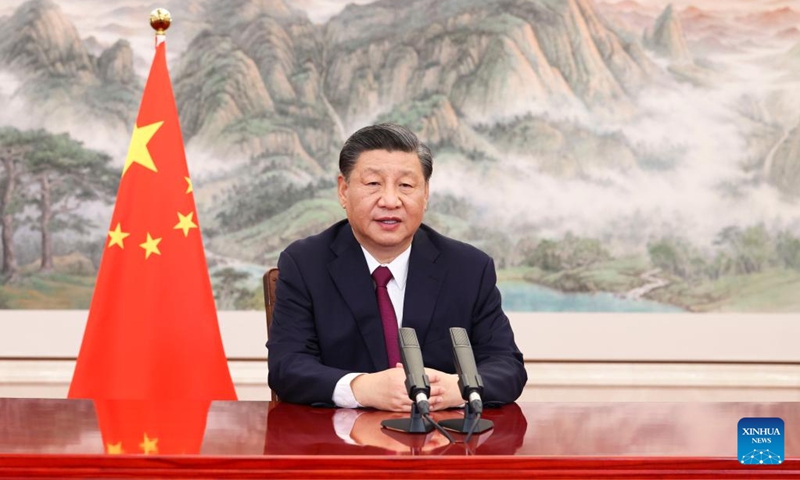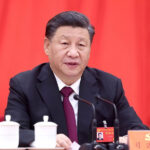Chinese President Xi Jinping proposed a global security initiative which stressed a commitment to the vision of common, comprehensive, cooperative and sustainable security and to reject a Cold War mentality, group politics and bloc confrontation while delivering a keynote speech via video link at the opening ceremony of the Boao Forum for Asia Annual Conference 2022 in South China’s Hainan Province on Thursday.
Analysts said the proposal was necessary and urgent amid rising concerns over the impact on global stability and the economy brought by the Ukraine crisis and attempts to build small cliques to create confrontation. It urges countries to take overall security concept to avoid the Cold War mentality.
President Xi pointed out that right now, changes in the world, of our times and of history are unfolding in ways like never before. The hardships and challenges are yet another reminder that humanity is a community with a shared future where all people rise and fall together, and that all countries need to follow the trend of the times.
Xi proposed the Global Security Initiative that is to stay committed to the vision of common, comprehensive, cooperative and sustainable security, and work together to maintain world peace and security. It rejects the Cold War mentality, opposes unilateralism, and say no to group politics and bloc confrontation.
The initiative also opposes the pursuit of one’s own security at the cost of others’ security or the wanton use of unilateral sanctions and long-arm jurisdiction, rejects double standards, and stays committed to peacefully resolving differences and disputes between countries through dialogue and consultation, and supports all efforts conducive to the peaceful settlement of crises.
“The Global Security Initiative is a new proposal but its contents are not unfamiliar to us as these are the principles and concepts China has always practiced and proposed on building shared, comprehensive, cooperative and sustainable security,” Guo Yanjun, Director of the Institute of Asian Studies at China Foreign Affairs University in Beijing, told the Global Times.
The current great changes to the international situation and order have underscored the relation between development and security. The proposal, which closely followed the Global Development Initiative, stresses security is the premise to development – making the two initiatives more logically integrated, Guo said.
While delivering a speech via video at the general debate of the 76th session of the United Nations General Assembly in September 2021, President Xi proposed a Global Development Initiative in steering global development toward a new stage of balanced, coordinated and inclusive growth in the face of severe shocks caused by COVID-19.
By stressing rejection to confrontations among different groups, the latest initiative proposed by Xi also stressed the relations between partial security and global security. A single country’s security is closely related to the region’s security and security issues are also closely related to other issues. No country can solve major security issues alone, analysts said.
Currently, the world is standing at the crossroad of being pushed into confrontations seen during the Cold War period or walking toward solidarity, Guo said, noting that President Xi’s proposal of the Global Security Initiative is both urgent and necessary.
The Russia-Ukraine conflict is the outcome of the Cold War mentality and also the geopolitical game that not only undermines regional security but also impacts global stability. The Global Security Initiative aims to jump out of the confrontation to take an overall view on security issues among different countries and regions. It offers the Chinese approach to promote peace, said Guo.
During the speech, President Xi also noted that in this day and age, the international community has evolved so much that it has become a sophisticated and integrated apparatus. Acts to remove any single part will cause serious problems to its operation. When that happens, both the victims and the initiators of such acts stand to lose.
“It is particularly important for major countries to lead by example in honoring equality, cooperation, good faith and the rule of law, and act in a way befitting their status,” said Xi.
President Xi also noted “We should stay committed to building an open world economy, increase macro policy coordination, keep global industrial and supply chains stable, all in an effort to promote balanced, coordinated and inclusive global development.”
Zhang Yuyan, director of the Institute of World Economics and Politics at the Chinese Academy of Social Sciences,told the Global Times that countries should continue to actively forging global supply chains and more specialized labor division will allow all partners to gain from trade.
“Attempts to sever the global supply chains will impact the interests of all parties,” Zhang said, noting that safeguarding the stability and security of global supply chains should be taken as a measure in the reform process of multilateral regime.
Speaking at a seminar on the sidelines of the forum, Alessandro Golombiewski Teixeira, a former chief economic advisor to the president of Brazil,told the Global Times on Wednesday that the world needs UN system to address issues like the global supply chain crisis, which is a complex situation, intensified by the US crackdown on China in the tech sphere. All the multilateral forums, including the G20 and G7, have a responsibility to help alleviate the supply chain crisis.
“Countries that are leading, such as China and the US, they have a responsibility of not only looking at themselves but also at the global situations. In this regard, I see China is doing, it is talking, it is explaining that it doesn’t want a conflict and states the needs to think globally,” Teixeira said.
It was Chinese President Xi’s sixth address at the forum. In 2021, Xi called on all countries in Asia and beyond to uphold multilateralism, embrace openness and enhance Belt and Road cooperation.
Leaders from Israel, Mongolia, Nepal, the Philippines, Kazakhstan, and Laos, as well as IMF managing director Kristalina Georgieva also attended the forum virtually.
Chinese President Xi Jinping delivers a keynote speech via video at the opening ceremony of the Boao Forum for Asia Annual Conference 2022, on April 21, 2022.(Photo: Xinhua)




